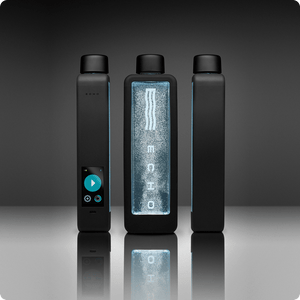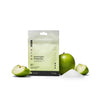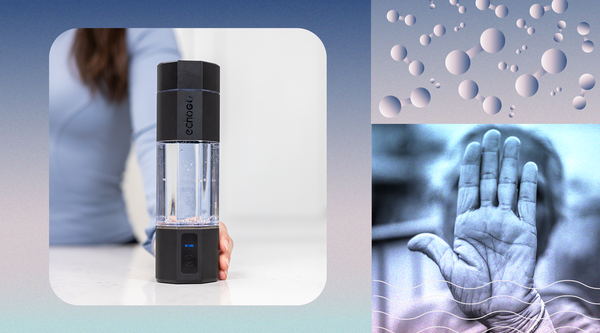Something is missing in your life. Everything seems to be going well, but you feel sluggish and sedentary. So you get yourself a membership to a local gym, specifically for the cycling classes.
Biking is one of your favorite past times. In college, that was your main means of transportation. You would race to each class, pretending you were in the Tour de France. You won every time, putting your hands in the air as you crossed the metaphorical finish line — a crack in the sidewalk right in front of the building you were about to walk into. People gave you weird stares, but they’re just jealous. They can’t be winners like you.
As you get your heart racing in cycling class, you close your eyes and pretend you’re in a different place and time. But now, instead of the Tour de France, you imagine the good ol’ days of college. You laugh as you imagine the weird looks on people’s faces.
Then you discover hydrogen water. You hear that it’s good for people who exercise regularly, and you try it out. At first, it doesn’t really do anything, but as you drink it everyday, you start feeling a difference. The time you need to recover after exercising starts decreasing, and you see a definite difference in your biking performance.
Biking might be the perfect sport to feel the effects of hydrogen water. In fact, when scientists want to study its effects on exercise, they usually use cycling for their testing. Studies are largely mixed on how it works or what it does, but overall, they do show that hydrogen can be helpful for people who exercise regularly.
Why Study Hydrogen’s Effect on Athletic Performance?
When you do any kind of exercise, your body creates little molecules called free radicals, which are known to cause oxidative stress.
We go really in depth about free radicals and oxidative stress in previous articles, but here is a summary about what it all means in very basic terms.
- Free radicals are molecules that can cause damage to the structure of your cells.
- Antioxidants are molecules that neutralize the free radicals, so they don’t do more damage.
- When there are a lot more free radicals than there are antioxidants, your body is in a state called oxidative stress.
- Oxidative stress is linked to the aging process as well as a number of diseases including heart disease, diabetes, Parkinson’s, and even cancer.
This oxidative stress is partly why your muscles feel tired or sore after you exercise, but that might not such a bad thing. A lot of that is neutralized by your body’s natural antioxidant system, and scientists speculate that having a little oxidative stress ultimately makes your body stronger.
But there’s a limit. If your exercises are too intense, you might be put in more oxidative stress than your body can handle.
Scientists have been looking into whether hydrogen can help reduce oxidative stress among people who regularly do intense exercises like athletes.
How Scientists Use Cycling To Study Hydrogen

Every study does things a little differently, but there are some elements that are usually very similar.
For one thing, these studies usually split participants into two or more groups. One group is generally called the treatment group which is given hydrogen. Usually, they drink hydrogen rich water, but other times, there are exceptions. One study actually had them drink a special milk, which caused hydrogen to be made within the gut.
The other group is known as the control group — also known as the placebo group. This one is usually given something neutral that looks and feels like the treatment. For example, if the treatment group is given magnesium tablets to put in their water — which creates hydrogen through a chemical reaction — another group will be given a tablet that doesn’t add anything to the water. It just makes it look the same as the treatment group’s water.
The reason they do this is because scientists need to measure whether the treatment is actually effective. Otherwise, any kind of effectiveness could be a placebo effect, which means the body thinks it’s being treated, so it works the problem out on its own.
After treatment, the participants are tested on a stationary cycle and told to keep a specific pace. Often, there will be a preliminary cycling round before the testing phase, where they take baseline measurements, warm up, and/or determine how much strenuous exercise each participant can take.
The scientists will collect data by measuring the participants’ breath, blood, heart rate, and other performance metrics.
Let’s take a look at three different studies and see what they have to say about hydrogen water.
Study One: Pilot Study
A 2012 study looked at whether hydrogen water would be beneficial to trained athletes when they exercise. It was a pilot study, which means it was smaller than other studies. The intention was to see if there was any effect so that bigger studies could look more into it.
In this study, ten male soccer players had to drink either hydrogen water or regular water a few times before being tested. They then did a preliminary test on the cycle ergometer where scientists tracked the rate of the maximal oxygen uptake, which is the amount of oxygen your body can take in and use.

During the test itself, the athletes maintained 75% of their oxygen uptake while they cycled for 30 minutes. Their breath was measured during the test, and their blood was taken before and after.
To measure performance in this study, the participants did a different exercise — knee extensions. Scientists used this part to measure muscle fatigue. They also took blood before and after this exercise.
They found that hydrogen water prevented the buildup of lactic acid — a chemical linked to fatigue and muscle soreness — in the blood. They also found that the athletes who drank hydrogen water didn’t have as much muscle fatigue as those who drank regular water.
One thing they didn’t find was a difference in oxidative stress markers between the groups. The researchers said this is probably because they train a lot, and therefore, they have active antioxidant systems. This idea is interesting to note because researchers in the next study we talk about have a very different idea.
Study Two: Athletes Vs. Non Athletes
In 2021, a study was published in which scientists explicitly tested how hydrogen worked on athletes vs. non athletes. There were two groups of participants in this study, people who exercised a moderate amount and trained cyclists.
There were two phases to this study. In the first, everyone would drink either hydrogen water or regular water over a period of seven days, and then they would be tested. In the second phase, they would switch. The ones who drank hydrogen water now drank regular water over another seven day period and vice versa, and then they would be tested again.
In this test, scientists had them do an anaerobic exercise on a cycle. This means it’s a highly intense exercise where the energy comes more from muscles than it does from oxygen. This can include things like weight training and sprinting.
After a three minute warm up, the participants were told to keep a high speed of 130 revolutions per minute (rpm), and the resistance was adjusted according to whether or not they could maintain at least 100 rpm. Through this, the scientists measured how much power each person was able to achieve.
The results showed that hydrogen water only helped the trained cyclists perform better on the anaerobic test. It didn’t do anything significant to the performance of non-athletes.
These researchers say the reason for this is probably because the athletes have a higher antioxidant capacity. The hydrogen rich water might have worked with their system in what they called a “synergistic effect.”
What’s interesting is these first two studies actually show similar things: hydrogen water can help with athlete’s performance. However, the reasoning is very different.
Study Three: Different Intervals
In a 2020 study, scientists wanted to know whether or not it made a difference that people just drank hydrogen water once vs. drinking it consistently. So they actually did two different experiments, each with different participants.
In both, they had participants pedal on a cycle. Every minute, they would add more resistance, making it more difficult for participants to stay at the 60 rpm pace they were told to keep. The testing stopped when the participants went below 50. The workload they were able to achieve at the end is how they measured performance, which they called “peak load.”
In the first experiment, participants were given either regular water or hydrogen water a half hour before cycling. The results showed that hydrogen water really didn’t affect them any more than regular water did.
In the second experiment, a different group of participants did the test before they were given either hydrogen water or regular water. This time, they drank it five times a week over a two-week period, and then they did the test once again.
Scientists found that the peak load increased among people who drank hydrogen water over two weeks. They also found an increase in oxygen uptake, which means their bodies were able to take in oxygen more effectively.
Interestingly, the participants of these studies weren’t necessarily trained athletes. They were just healthy enough to perform the test. This suggests that hydrogen water might be effective whether or not you’re good enough to compete in the Tour de France.
What All of This Means

All of these studies suggest that hydrogen water can be helpful to your cycling performance. It can reduce muscle fatigue, muscle soreness, and it can increase the amount of power you put into your workout.
There are some discrepancies in the results and explanations, but that’s partly because the study of hydrogen as a therapeutic antioxidant is fairly new. This just means that there is a lot more research to be done. Scientists can test different sample sizes, different genetic makeups, different residential areas, etc. All of this will give us a better picture about how it all works.
Where Can You Get Hydrogen Water?
There are several ways to get hydrogen water, but the easiest and most cost effective is the Echo Go+ Hydrogen Water Bottle. You just add distilled water, set the timer according to how much hydrogen you want it, and wait a few minutes.
It works by breaking down chemical bonds within the water with an electric current. Some of the hydrogen atoms then bond with each other, and there you have it, hydrogen water.
The Echo Go+ is highly portable, so you can take it to the gym. You can drink hydrogen before, during, or after your intense cycling sessions.
Click here to buy yours today!








